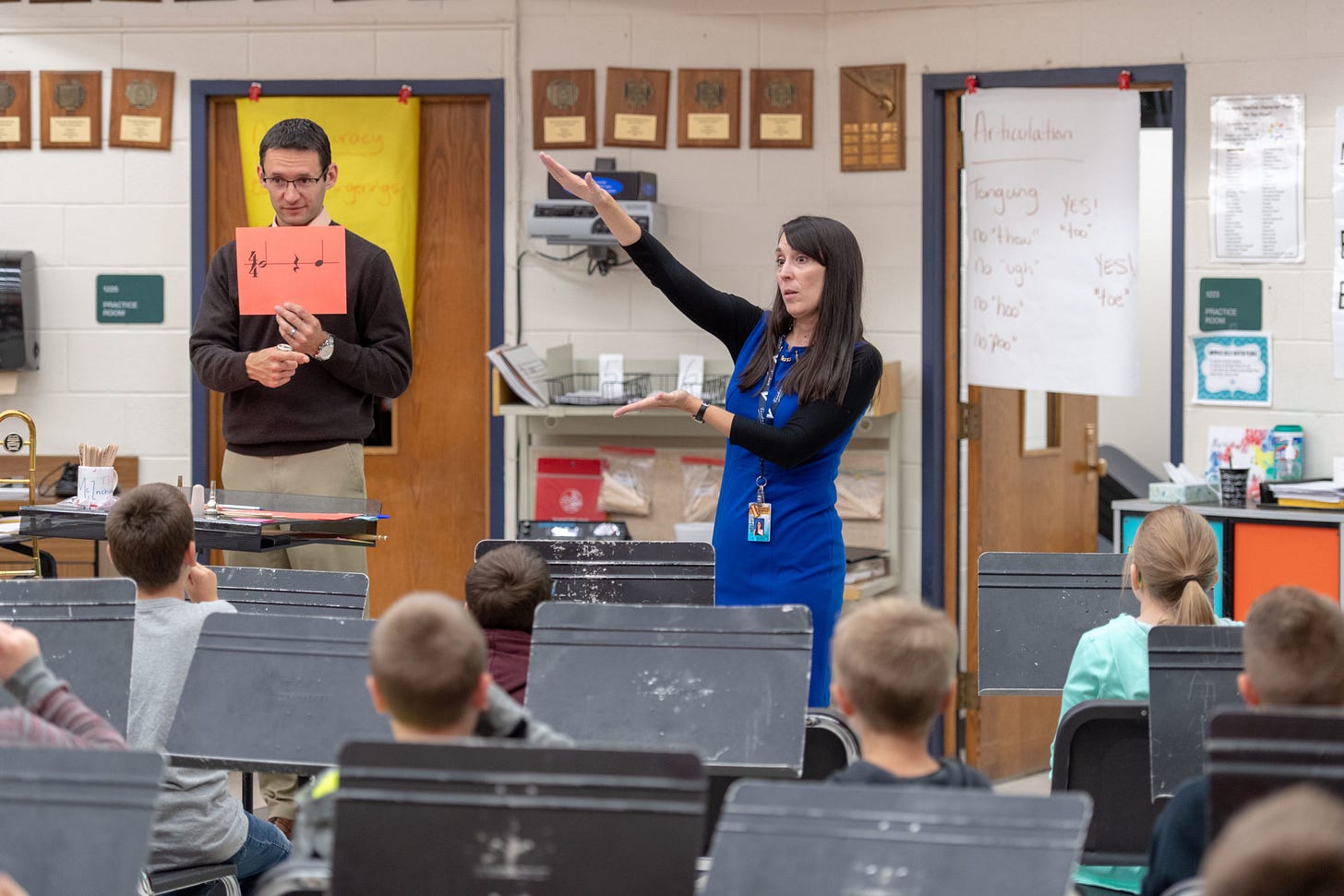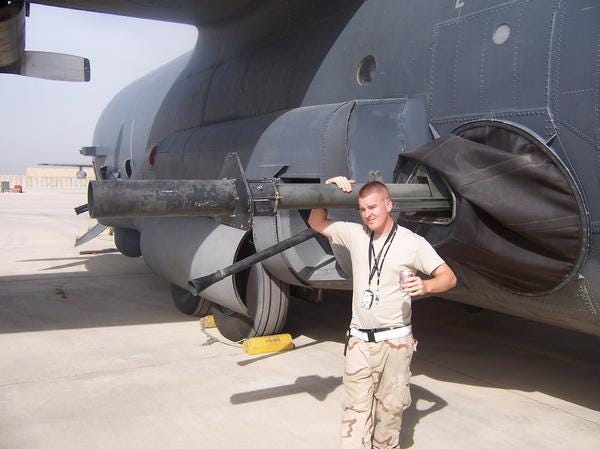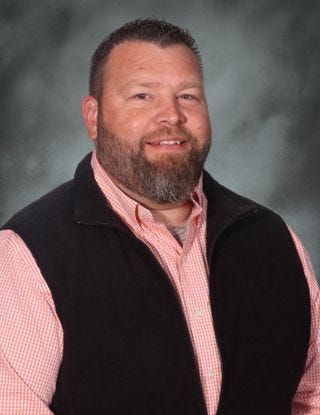Leadership Outside The Military
Highlighting a few leaders I'd follow into battle, whatever the battle may be
I joined the US Air Force in 2004, soon after the towers fell. By 2007, I was waiting out a series of mortar attacks from a bunker at a large air base just north of Baghdad. Sometimes the bunkers served as a relief from the scorching Iraqi sun, if you didn’t mind the concrete dust from the explosions getting into your eyes. I was greeted as a hero when I returned home, but all I really did was fix jet engines. Fixing them in Florida or fixing them in Iraq seemed all the same to me.
Returning home to Hurlburt Field, FL (July 4th, 2007)
My great uncle Jack, a Korean War veteran, once confessed that he did not see himself as a brave man. He then clarified by saying that if he stood next to a brave man, he could be brave. I’ve found this to be true in terms of leadership, and I’ve become a better leader by standing next to leaders who have become my heroes. Each share a unique trait that I’ve benefited from.
Vulnerability
Chloe Hendricks is an elementary school teacher at the same school that our daughter attended when Holly and I lived in Pensacola. We met during a business trip to Pensacola in 2018. Whenever I mentioned the school, Chloe’s eyes lit up. She always had a story about something her students said that day, or how excited she was for her kids to see their new classroom at the end of summer. I didn’t know anything about public education back then, but I thought it was cute.
In the years since, Chloe would send me pictures of her classroom setups. The COVID years were dark and depressing at times, but her photos always made me smile. For those kids, some of them with unstable homes, Chloe was their reason to smile. Her students didn’t just respect her, they loved her. Never one to cloak her emotions, that vulnerability in such a turbulent time was a stabilizing force in those kid’s lives. In an era where we were forced apart, she brought them close.
(Text from elementary parent)
It takes courage to be vulnerable, but children need to see it. In an educational setting, it builds trust and authenticity. It’s instrumental in creating safe emotional spaces. It helps model emotional regulation. Years in the military taught me to be guarded, rigid, and even apathetic. Chloe’s ability to channel her inner child to relate to her students was like watching a part of me that had since died. She was the inspiration that drove me to get my substitute teaching license.
During my first year as a sub, I considered quitting a few times. I had imposter syndrome, and sometimes felt like I was in a foreign world. Chloe always managed to keep me in the game. She would remind me we need more male teachers, or tell me funny stories about mistakes she once made. I realized I needed to stop being so rigid and just have fun. Emotional modeling works for adults too, and Chloe leads by example. Her ability to be so vulnerable about challenges and failure is what kept me going. Well, that and making extra cash so I could spoil her students.
Excellence
Elite military units work with precision. This precision is created through a firm chain of command. This rank structure reinforces authority and eliminates confusion or insubordination. My role as a contractor has a distinct requirement to “influence stakeholders without formal authority”. It’s not easy. While leading within this rank structure is certainly no walk in the park, leading with no rank structure is even more cumbersome. Leading middle schoolers without that rank structure to a level of excellence recognized regionally is almost unthinkable.
Joe and Kellie McInchak
And yet, Joe McInchak, along with his wife Kellie, do this every day. Joe is our school district’s band director, and I’ve had the privilege of subbing for and with Joe and his wife a few times. The respect he inspires from his students, including from my own daughter, is remarkable. I’ve never heard him raise his voice, and I’ve never heard him use threats to correct behavior. I don’t know how he does it, but I’ve witnessed the results. Our state has too: Music Teachers Dominate Across Michigan
Over Christmas, I showed my parents my poorly recorded cell phone video of a recent high school band performance. My mother, a pianist and music teacher herself, was amazed. She said she had never heard that level of precision from a 9th grade performance. “I can even hear the effort put into phrasing!” she told me. What amazed me was that the quality Joe demanded from his students was evident even through a grainy cell phone clip.
I subbed with Joe days prior to that performance, and got to see first hand how he prepared. The students started out just as fidgety as any other class, but the way Joe responded gave me a glimpse into his leadership style. I used an example from a specific incident in another article I wrote at the time:
I’ve always been an admirer of Joe and Kellie McInchak, our district’s band directors. Today, a few 6th graders were making poor choices. They were playing their kazoos instead of listening to Joe’s direction. Joe looked at a student and said (in his calm, Joe voice), “Sometimes, we have to set the proper example so that others have something to follow”. The student raised her saxophone to her lips quietly, ready to take direction. The class began to notice, and quickly fell in line. Joe’s words hit me hard.
From: A Message To The Bullies
Good leaders lead. Great leaders inspire. I spent six years studying psychology, but all the textbook theory in the world did not prepare me to lead. I was inspired by Joe’s leadership just as his students were, and by his commitment to excellence in every small detail. In a way, I’m a student of Joe’s as well. When a good leader leaves, the “troops” suffer. When a great leader leaves, the “troops” retain that inspiration and become leaders themselves. My own daughter is a testament to the leadership Joe inspires.
Perseverance
“Good morning! We’re so happy you’re here today!” Was the greeting I got from Tecumseh Middle School principal Trisha Howard the first day I clocked in as a substitute teacher. I work as a defense contractor in my “day job” with many retired military folks. No one is that happy. I smiled back as I wondered how many expresso shots went in her latte. Like my first experience with Chloe, I had trouble processing how that much positivity could ever be genuine.
Tecumseh Middle School Principal Trisha Howard
I would describe my time in Iraq as chaotic. A typical shift started by directing an AC-130U gunship into it’s parking spot between two concrete walls, in the dead of night, with no flood or landing lights, using glowsticks, while being ready to run for cover from mortar attacks. After two years at our local middle school, I would now describe my daily routine overseas as a “slow Tuesday” compared to the stressors middle school administrators face.
AC-130U Gunship, Balad AB, Iraq
Imagine, if you will, being charged with the education of almost 800 students. Your district closes two schools, so now you have new grades, with no additional facilities or resources. You have a furnace that trips the fire alarm at random times, forcing periodic evacuation of all 800 students. The district can’t afford to replace it. You go home and scroll Facebook to see angry parents rallying pitchforks because the evacuation cut into their student’s lunch hour. It’s all your fault even if it isn’t.
Tecumseh Middle School Vice Principal Kris Hoag
I was a sub one of the days this occurred. I told our vice principal, Kris Hoag, that I thought they did a splendid job handling it. He said, “That’s it, we’re not perfect, but we can adapt quickly”. The Prussian military strategist Carl von Clausewitz once wrote, “No campaign plan survives first contact with the enemy”. Trisha and Kris face first contacts with the “enemies” of unknown and unforeseen situations on a daily, even hourly basis. They lead, and each time they adapt, and they overcome.
They overcome, and they find the time to serve pancakes to veterans. They overcome, and find the time to individually mentor students. They overcome, and they somehow find a way to keep smiling, making new subs like me feel welcome. Perseverance is what separates good leaders from great leaders. We all have good days and bad days, but it takes real leadership to maintain consistency through both. Our motto in Tecumseh Schools is “Every Student, Every Day”. “Most days” would be easy, “every day” is not. It takes perseverance. Trisha and Kris model this every day. And the smile is always genuine.
Unsung Heroes
I consider myself a student of leadership. I’ve often lamented that I never had good mentors in the military, but I realized leadership is often demonstrated through action, not lecture. I became an educator to be the mentor I didn’t have, but ended up being mentored by example from those I “stood next to”, as my uncle had in Korea. Each of these unsung heroes demonstrated leadership traits that I’ve carried with me in every aspect of my life, even as a parent.
We use the phrase “unsung heroes” as a reference to when great warriors would have minstrels singing their stories in local taverns. While these educators might not have their songs sung in the taverns, their songs are sung elsewhere. They are sung by an entire generation of children that had true leadership modeled for them. They are sung when these students become the leaders they were inspired to be. They are sung by veterans like me as I tell my daughter, “This is leadership”.












